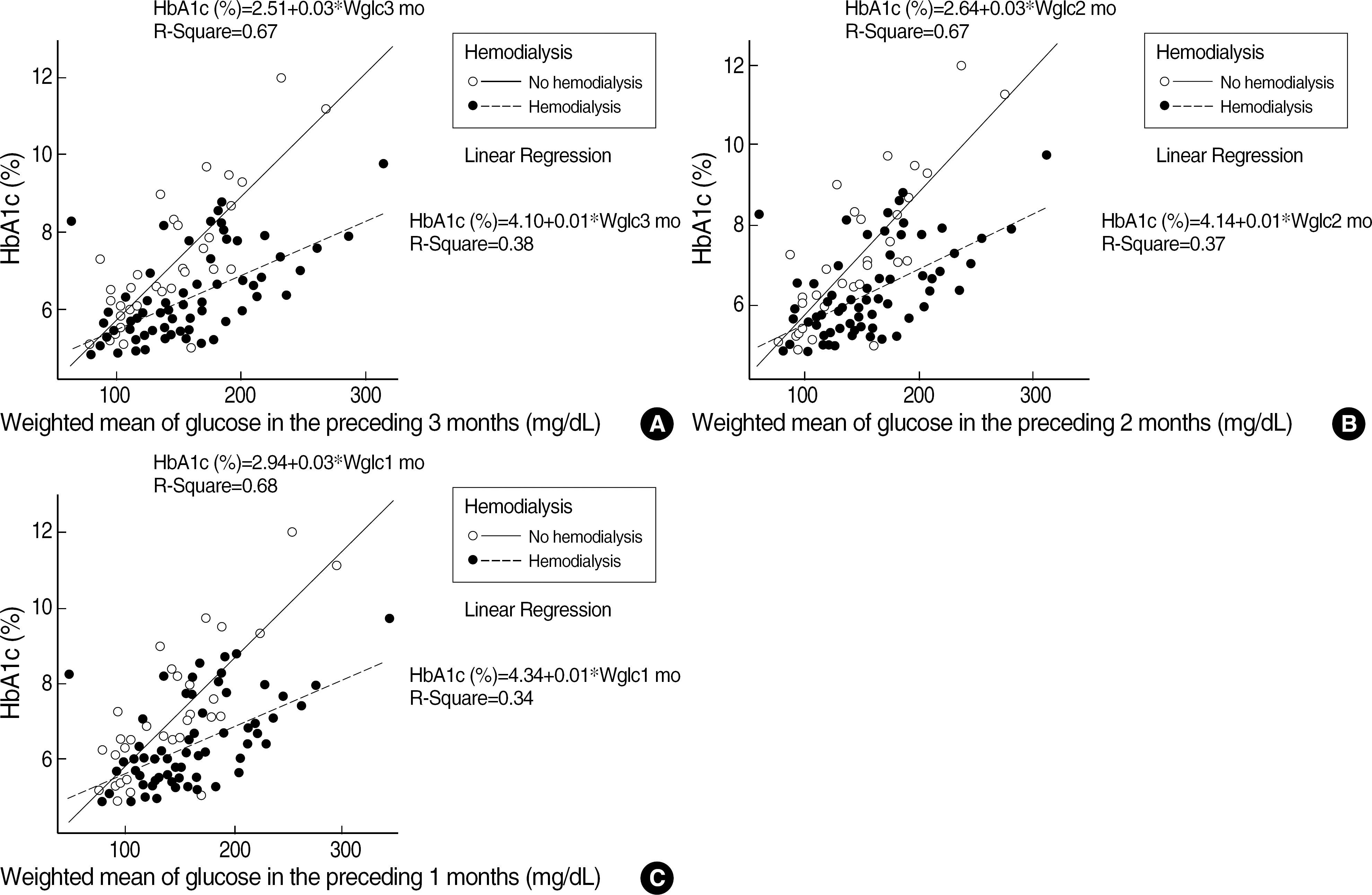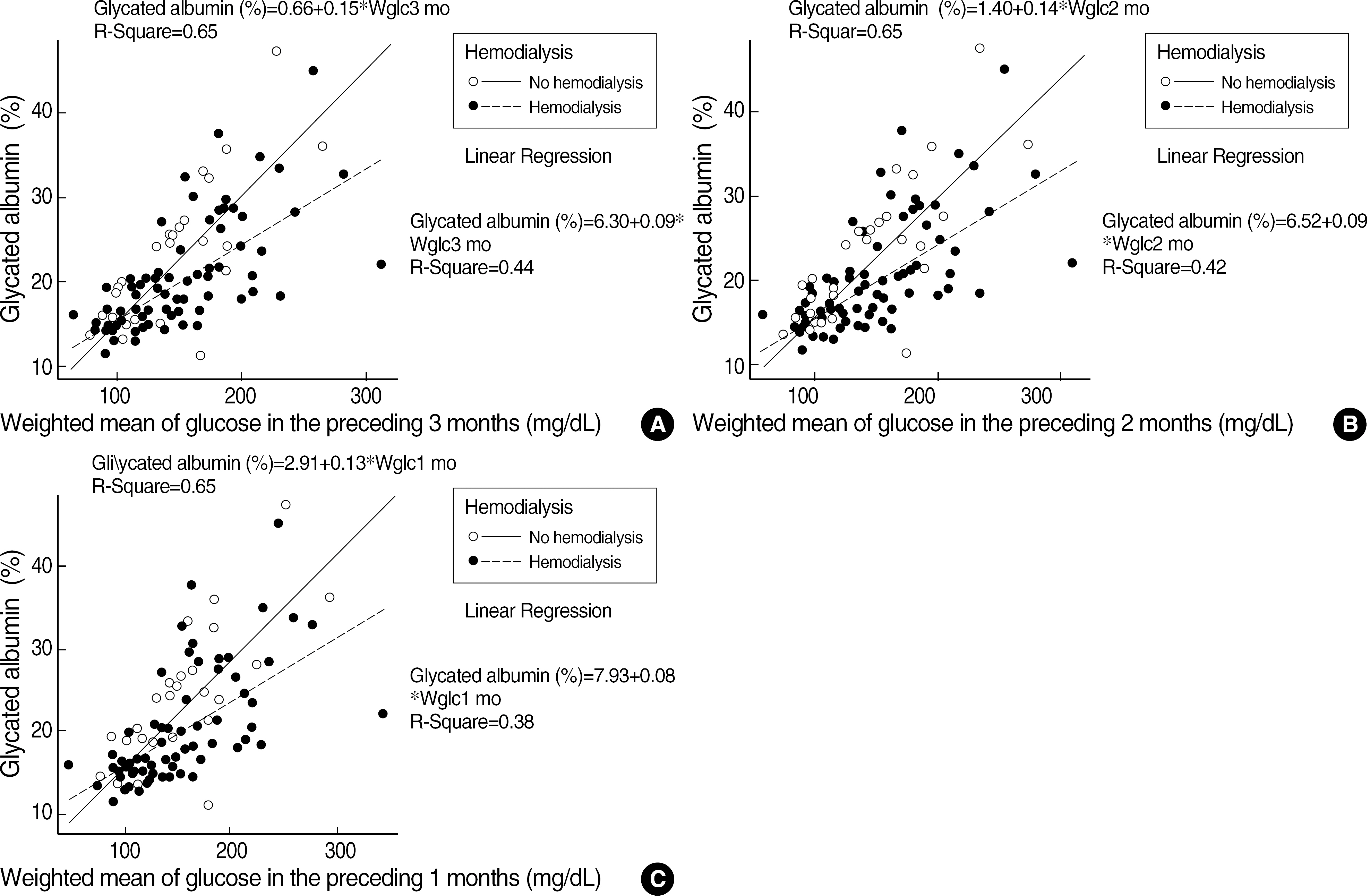Korean J Lab Med.
2009 Oct;29(5):406-414. 10.3343/kjlm.2009.29.5.406.
Performance Characteristics of Glycated Albumin and Its Clinical Usefulness in Diabetic Patients on Hemodialysis
- Affiliations
-
- 1Department of Laboratory Medicine, College of Medicine, The Catholic University of Korea, Seoul, Korea. lyejh@catholic.ac.kr
- 2Department of Internal Medicine, College of Medicine, The Catholic University of Korea, Seoul, Korea.
- KMID: 1077416
- DOI: http://doi.org/10.3343/kjlm.2009.29.5.406
Abstract
- BACKGROUND
The HbA1c has been considered to underestimate glucose level in diabetic patients on hemodialysis, therefore, glycated albumin (GA) was recently introduced to assess the glycemic control for those cases. We evaluated the performance of GA assay kit of Lucica GA-L (Asahi Kasei Pharma Co., Japan) and compare it with HbA1c for estimating glucose levels.
METHODS
Tests for precision, linearity and interference were performed and reference interval was determined. Thirty eight of non-hemodialysis and seventy of hemodialysis patients were recruited, whose glucose levels of three-, two- and one-month prior to this study were available for calculating weighted means of glucose (WMGs). The correlation coefficients and the slopes of regression equation between WMG and HbA1c or GA were compared between two groups. Multiple linear regression analyses were used to determine significant predictor for HbA1c and GA.
RESULTS
Total CV was 2.2% at concentration of 13.7% and 2.8% at 24.6%. The dilution curve between 15.7% and 62.1% was linear. Reference intervals were 10.0% to 16.5% for male and 11.4% to 17.6% for female. The correlation coefficients between WMG and GA were 0.682-0.713 in hemodialysis and 0.640-0.677 in non-hemodialysis. Those between WMG and HbA1c were 0.568-0.625 in hemodialysis and 0.735-0.783 in non-hemodialysis. The slopes of regression equation between GA and WMG in hemodialysis were 0.080-0.090 and 0.130-0.147 in non-hemodialysis. Those between HbA1c and WMG in hemodialysis were 0.012-0.014 and 0.029-0.032 in non-hemodialysis. GA was not influenced by hemodialysis status while HbA1c was.
CONCLUSIONS
The claimed performance characteristic of Lucica GA-L were verified. WMG were better reflected by GA rather than HbA1c in patients on hemodialysis.
Keyword
MeSH Terms
Figure
Reference
-
1.Dunn PJ., Cole RA., Soeldner JS., Gleason RE. Reproducibility of hemoglobin AIc and sensitivity to various degrees of glucose intolerance. Ann Intern Med. 1979. 91:390–6.
Article2.The effect of intensive treatment of diabetes on the development and progression of long-term complications in insulin-dependent diabetes mellitus. The Diabetes Control and Complications Trial Research Group. N Engl J Med. 1993. 329:977–86.3.Ohkubo Y., Kishikawa H., Araki E., Miyata T., Isami S., Motoyoshi S, et al. Intensive insulin therapy prevents the progression of diabetic microvascular complications in Japanese patients with non-insulin-dependent diabetes mellitus: a randomized prospective 6-year study. Diabetes Res Clin Pract. 1995. 28:103–17.
Article4.Intensive blood-glucose control with sulphonylureas or insulin compared with conventional treatment and risk of complications in patients with type 2 diabetes (UKPDS 33). UK Prospective Diabetes Study (UKPDS) Group. Lancet. 1998. 352:837–53.5.Goldstein DE., Little RR., Lorenz RA., Malone JI., Nathan D., Peterson CM, et al. Tests of glycemia in diabetes. Diabetes care. 2004. 27:1761–73.
Article6.Wu MS., Yu CC., Yang CW., Wu CH., Haung JY., Hong JJ, et al. Poor pre-dialysis glycaemic control is a predictor of mortality in type II diabetic patients on maintenance haemodialysis. Nephrol Dial Transplant. 1997. 12:2105–10.
Article7.Morioka T., Emoto M., Tabata T., Shoji T., Tahara H., Kishimoto H, et al. Glycemic control is a predictor of survival for diabetic patients on hemodialysis. Diabetes Care. 2001. 24:909–13.
Article8.Menon V., Greene T., Pereira AA., Wang X., Beck GJ., Kusek JW, et al. Glycosylated hemoglobin and mortality in patients with nondiabetic chronic kidney disease. J Am Soc Nephrol. 2005. 16:3411–7.
Article9.Oomichi T., Emoto M., Tabata T., Morioka T., Tsujimoto Y., Tahara H, et al. Impact of glycemic control on survival of diabetic patients on chronic regular hemodialysis: a 7-year observational study. Diabetes Care. 2006. 29:1496–500.10.Nakao T., Matsumoto H., Okada T., Han M., Hidaka H., Yoshino M, et al. Influence of erythropoietin treatment on hemoglobin A1c levels in patients with chronic renal failure on hemodialysis. Intern Med. 1998. 37:826–30.
Article11.Chujo K., Shima K., Tada H., Oohashi T., Minakuchi J., Kawashima S. Indicators for blood glucose control in diabetics with end-stage chronic renal disease: GHb vs. glycated albumin (GA). J Med Invest. 2006. 53:223–8.
Article12.Inaba M., Okuno S., Kumeda Y., Yamada S., Imanishi Y., Tabata T, et al. Glycated albumin is a better glycemic indicator than glycated hemoglobin values in hemodialysis patients with diabetes: effect of anemia and erythropoietin injection. J Am Soc Nephrol. 2007. 18:896–903.
Article13.Peacock TP., Shihabi ZK., Bleyer AJ., Dolbare EL., Byers JR., Knovich MA, et al. Comparison of glycated albumin and hemoglobin A (1c) levels in diabetic subjects on hemodialysis. Kidney Int. 2008. 73:1062–8.14.Morgan L., Marenah CB., Jeffcoate WJ., Morgan AG. Glycated proteins as indices of glycaemic control in diabetic patients with chronic renal failure. Diabet Med. 1996. 13:514–9.
Article15.Joy MS., Cefalu WT., Hogan SL., Nachman PH. Long-term glycemic control measurements in diabetic patients receiving hemodialysis. Am J Kidney Dis. 2002. 39:297–307.
Article16.Ansari A., Thomas S., Goldsmith D. Assessing glycemic control in patients with diabetes and end-stage renal failure. Am J Kidney Dis. 2003. 41:523–31.
Article17.Williams ME., Lacson E Jr., Teng M., Ofsthun N., Lazarus JM. Hemodialyzed type I and type II diabetic patients in the US: Characteristics, glycemic control, and survival. Kidney Int. 2006. 70:1503–9.
Article18.Jones IR., Owens DR., Williams S., Ryder RE., Birtwell AJ., Jones MK, et al. Glycosylated serum albumin: an intermediate index of diabetic control. Diabetes Care. 1983. 6:501–3.
Article19.Ziel FH., Davidson MB. The role of glucosylated serum albumin in monitoring glycemic control in stable insulin-requiring diabetic out-patients. J Clin Endocrinol Metab. 1987. 64:269–73.
Article20.Worner W., Pfleiderer S., Rietbrock N. Selective determination of non-enzymatic glycosylated serum albumin as a medium term index of diabetic control. Int J Clin Pharmacol Ther Toxicol. 1993. 31:218–22.21.Takahashi S., Uchino H., Shimizu T., Kanazawa A., Tamura Y., Sakai K, et al. Comparison of glycated albumin (GA) and glycated hemoglobin (HbA1c) in type 2 diabetic patients: usefulness of GA for evaluation of short-term changes in glycemic control. Endocr J. 2007. 54:139–44.
Article22.Guthrow CE., Morris MA., Day JF., Thorpe SR., Baynes JW. Enhanced nonenzymatic glucosylation of human serum albumin in diabetes mellitus. Proc Natl Acad Sci USA. 1979. 76:4258–61.
Article23.Dolhofer R., Wieland OH. Improvement of the thiobarbituric acid assay for serum glycosylprotein determination. Clin Chim Acta. 1981. 112:197–204.
Article24.Ney KA., Colley KJ., Pizzo SV. The standardization of the thiobarbituric acid assay for nonenzymatic glucosylation of human serum albumin. Anal Biochem. 1981. 118:294–300.25.Reed P., Bhatnagar D., Dhar H., Winocour PH. Precise measurement of glycated serum albumin by column affinity chromatography and immunoturbidimetry. Clin Chim Acta. 1986. 161:191–9.
Article26.Ikeda K., Sakamoto Y., Kawasaki Y., Miyake T., Tanaka K., Urata T, et al. Determination of glycated albumin by enzyme-linked boronate immunoassay (ELBIA). Clin Chem. 1998. 44:256–63.
Article27.Kouzuma T., Usami T., Yamakoshi M., Takahashi M., Imamura S. An enzymatic method for the measurement of glycated albumin in biological samples. Clin Chim Acta. 2002. 324:61–71.
Article28.Kouzuma T., Uemastu Y., Usami T., Imamura S. Study of glycated amino acid elimination reaction for an improved enzymatic glycated albumin measurement method. Clin Chim Acta. 2004. 346:135–43.
Article29.Paroni R., Ceriotti F., Galanello R., Battista Leoni G., Panico A., Scurati E, et al. Performance characteristics and clinical utility of an enzymatic method for the measurement of glycated albumin in plasma. Clin Biochem. 2007. 40:1398–405.
Article30.Clinical and Laboratory Standards Institute. Evaluation of precision performance of quantitative measurement methods; approved guideline EP5-A2. Wayne, PA: Clinical and Laboratory Standards Institute;2006.31.Ricos C., Alvarez V., Cava F., Garcia-Lario JV., Hernandez A., Jimenez CV, et al. Current databases on biological variation: pros, cons and progress. Scand J Clin Lab Invest. 1999. 59:491–500.32.Clinical and Laboratory Standards Institute. Evaluation of the linearity of quantitative measurement procedures: a statistical approach; approved guideline EP6-A. Wayne, PA: Clinical and Laboratory Standards Institute;2003.33.Clinical and Laboratory Standards Institute. Interference testing in clinical chemistry; approved guideline EP7-A2. Wayne, PA: Clinical and Laboratory Standards Institute;2005.34.Clinical and Laboratory Standards Institute. How to define and determine reference intervals in the clinical laboratory; approved guideline C28-A2. Wayne, PA: Clinical and Laboratory Standards Institute;2000.35.Sacks DB. Carbohydrates. Burtis CA, Ashwood ER, editors. Tietz Textbook of Clinical Chemistry and Molecular Diagnostics. 4th ed.St. Louis: Elsevier Saunders;2006. p. 837–902.
- Full Text Links
- Actions
-
Cited
- CITED
-
- Close
- Share
- Similar articles
-
- The Roles of Glycated Albumin as Intermediate Glycation Index and Pathogenic Protein
- Estimating Average Glucose Levels from Glycated Albumin in Patients with End-Stage Renal Disease
- Comparison of Nutritional Status and Inflammational Markers in DM and nonDM Hemodialysis Patients
- Usefulness of glycated albumin level as a glycemic index complementing glycosylated hemoglobin in diabetic children and adolescents
- Meaning of TCO2 in the Diabetic and Non-diabetic Patients Undergoing Long-term Hemodialysis



